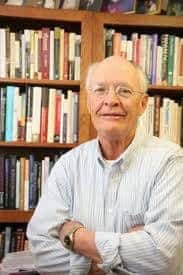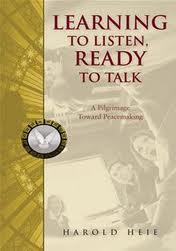 This past Friday, Dr. Harold Heie (pronounced “high”) spoke to the Eastern University community on “Creating a Welcoming Space for Respectful Conversation about Controversial Issues” (part of the Windows on the World series).
This past Friday, Dr. Harold Heie (pronounced “high”) spoke to the Eastern University community on “Creating a Welcoming Space for Respectful Conversation about Controversial Issues” (part of the Windows on the World series).
The auditorium was overflowing.
Heie is known for finding ways for Christians to talk about difficult topics. In fact he has an entire website dedicated to the effort, respectfulconversation.net. He has also written about the subject, most profoundly in Learning to Listen, Ready to Talk: A Pilgrimage Toward Peacemaking.
Heie is particularly interested in how all of this work in Christian Colleges, and he’s got the chops  to back it up. He is a Senior Fellow at the Center for Christian Studies at Gordon College (Wenham, MA), where he served as Founding Director from 1994 to 2003. He previously served as Vice President for Academic Affairs at Messiah College (1988-1993) and Northwestern College in Iowa (1980-1988). Prior to that, he taught mathematics at Gordon College (1975-1980) and The King’s College (1963-1975).
to back it up. He is a Senior Fellow at the Center for Christian Studies at Gordon College (Wenham, MA), where he served as Founding Director from 1994 to 2003. He previously served as Vice President for Academic Affairs at Messiah College (1988-1993) and Northwestern College in Iowa (1980-1988). Prior to that, he taught mathematics at Gordon College (1975-1980) and The King’s College (1963-1975).
Heie has also held a number of leadership positions at the Council for Christian Colleges and Universities (CCCU), primarily focusing on leading national and regional faculty development workshops. He has spoken or consulted at over 50 CCCU instututions, and now serves the CCCU as a Senior Fellow. He is also a member of the Board of Fellows for the Ph.D. Program in Organizational Leadership at Eastern University. He has been active for many years with the Center for Public Justice (Annapolis, MD), including service as a trustee for 9 years.
Throw in an MA and PhD in mechanical and aerospace engineering from Princeton University (1961, 1965) and you’ve got a pretty smart guy whose been around the block a few times and has learned some things worth passing on.
I was personally quite taken by his demeanor, tone, and context (not to mention his Brooklyn accent). He is genuine and sincere, the kind of person you want to bottle and call upon when you feel yourself losing your temper. I left the lecture pondering how I and many others have been affected by the anti-Heies of the Christian world.
Much more importantly, I was reminded yet again that it is my responsibility to be an agent of peace in the little village of ideas I inhabit.
 Heie made four points–easy to write, easy to talk about, excruciatingly difficult to pull off. But, whoever said this Jesus thing was going to be easy, given that the precondition for being a follower of Jesus is death to oneself (Luke 9:24).
Heie made four points–easy to write, easy to talk about, excruciatingly difficult to pull off. But, whoever said this Jesus thing was going to be easy, given that the precondition for being a follower of Jesus is death to oneself (Luke 9:24).
Humility–You know, that word we toss around, what we think we’re pulling off when we put ourselves on the back burner for a minute or two.
Humility is a death word, what Paul calls being “crucified with Christ” (Galatians 2:20). I am willing to guess (I never counted), that humility is one of the most common, if not the most common, descriptor of what a follower of Christ is supposed to look like.
The hard part is that it starts with us. Our job isn’t to make sure others are being humble. It doesn’t matter what people around us are doing.
Courage–In this context, Heie is referring to institutional courage to seek truth regardless of constituency pressure. For all of you laughing or rolling your eyes out there at Heie’s naivete about the financial realities schools face, re-read his credentials above.
He also mentioned the courage needed by individual faculty members to pursue truth, and with that, an administration that supports faculty in doing so (yes, yes, and yes). And no that doesn’t mean anything goes (can we drop that comeback already?) Academic freedom is an open, community discussion. Not the stuff of back room politicking.
To seek truth–I mean really to seek truth, wherever it goes–takes courage.
Patience–We should not jump the gun with each other as we talk about hard things. We should not hold on to our truth as if it is the Truth, since we are all seeking Truth. Having patience means accepting the possibility of needing to hear the other out and that you may need to think things through as a result. Despite what a lot of Christians (on the internet) seem to think, not every disagreement is a “Galatians moment” where the Gospel is at stake. This process of self-evaluation, respect of the other, and resulting change is a proces that takes time and patience.
Patience seems to be the flip side of humility.
Love–Love covers all of these terms and then some. Love is patient and kind; it does not boast or dishonor the other; it is not easily angered; it rejoices with the truth. (1 Corinthians 13)
Whenever I think about trying to live like this I break out into a dripping sweat like I’ve been doing yoga for an hour.
A profound talk by Heie, but, to tell you the truth, I was also a bit discouraged. I mean, can we really pull this off? I have to tell you, I don’t see it.
Generally speaking the kind of character traits we are called to work toward as individual followers of Jesus are difficult to translate into institutional life, where defending tradition and raising funds (both important tasks) become the daily object of devotion and fervor.
I really don’t know where all this is going. But then again, seeing into the future is not by job. My job is far less complicated, but far more difficult: controlling what I say, think, and do.
Who knows. If we all did that–faculty, administrators, and donors–the institutional problems might take care of themselves.
